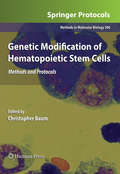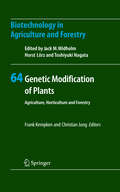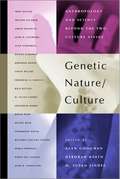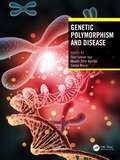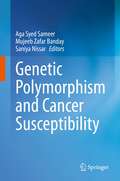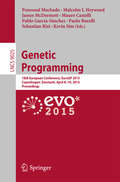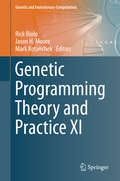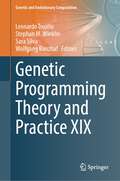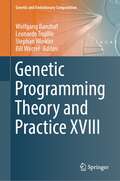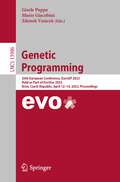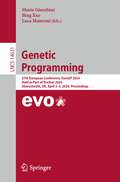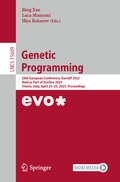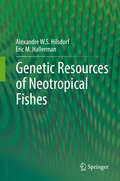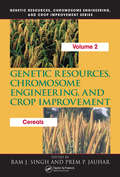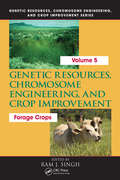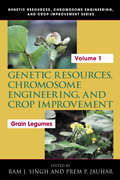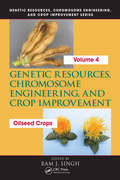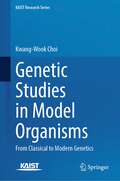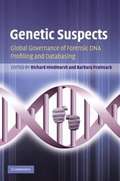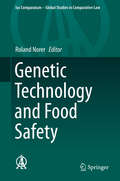- Table View
- List View
Genetic Modification of Hematopoietic Stem Cells
by Christopher BaumWith the incredible potential of gene transfer into hematopoietic stem cells, active research in this field has become critically important. In "Genetic Modification of Hematopoietic Stem Cells: Methods and Protocols", leading scientists in the field provide a compendium of protocols which cover the subject comprehensively, from the purification and culture of various types of hematopoietic cells for subsequent genetic modification by vector development and technical issues of small and large scale vector production, to the complex issue of monitoring and biosafety studies related to gene-modified hematopoiesis. Written in the highly successful Methods in Molecular BiologyTM series format, the chapters in this volume present brief introductions to the topic, lists of the necessary materials and reagents, step-by-step, readily reproducible laboratory protocols, and Notes sections, which allow the experts to highlight tips on troubleshooting and avoiding known pitfalls. Unique and cutting-edge, "Genetic Modification of Hematopoietic Stem Cells: Methods and Protocols" is an ideal, thorough resource to promote further research and the implementation of investigator-driven clinical studies using gene-modified hematopoietic cells.
Genetic Modification of Plants
by Frank Kempken Christian JungConceived with the aim of sorting fact from fiction over genetically modified (GM) crops, this book brings together the knowledge of 30 specialists in the field of transgenic plants. It covers the generation and detection of these plants as well as the genetic traits conferred on transgenic plants. In addition, the book looks at a wide variety of crops, ornamental plants and tree species that are subject to genetic modifications, assessing the risks involved in genetic modification as well as the potential economic benefits of the technology in specific cases. The book's structure, with fully cross-referenced chapters, gives readers a quick access to specific topics, whether that is comprehensive data on particular species of ornamentals, or coverage of the socioeconomic implications of GM technology. With an increasing demand for bioenergy, and the necessary higher yields relying on wider genetic variation, this book supplies all the technical details required to move forward to a new era in agriculture.
Genetic Nature / Culture: Anthropology and Science Beyond the Two-Culture Divide
by Alan H. Goodman Deborah Heath M. Susan LindeeThis volume of original scholarship focuses on how anthropology is affected by and should respond to the wide range of issues associated with the culture and practice of genetics.
Genetic Polymorphism and Disease
by Mujeeb Zafar Banday Saniya Nissar Syed Sameer AgaGenetic polymorphisms are important determinants of phenotypic variations and may modulate the risk to or even cause various diseases including genetic disorders and multifactorial diseases. Genetic polymorphisms also serve as important genetic, population and evolutionary markers that allow the study of genetic and evolutionary aspects of individuals, populations and organisms and aid in tracing the evolutionary and parental lineages. Genetic polymorphisms in low penetrance genes are responsible for the alterations in the gene expression of critical signal transduction proteins and metabolic enzymes. Some of these polymorphisms are linked to increased susceptibility to various diseases especially cancers, cardiovascular diseases, immune disorders, neurological pathologies. This book collates the reviews on the roles played by polymorphisms in critical metabolic, signal transduction, cell cycle or DNA repair genes either directly or indirectly in the disease mechanisms. The focus is on various techniques for identifying the various Single Nucleotide Polymorphisms (SNPs). Polymorphism studies document the affect SNPs, and their expressions have upon the functionality of the enzymes, proteins. Key Features Describes the genetic polymorphism and its various types Discusses the role of genetic polymorphisms in modulating the risk of various human diseases Explores various molecular techniques used for detecting GPs Characterizes the role of SNPs in modulating the susceptibility of human diseases Provides a genetic basis for individual variations in response to therapeutics
Genetic Polymorphism and cancer susceptibility
by Aga Syed Sameer Mujeeb Zafar Banday Saniya NissarThis book discusses the role of genetic polymorphism in susceptibility to cancers. The book explores the understanding of differences between the genetic polymorphisms and mutations.It reviews the mechanisms underlying the effect of polymorphism in genes encoding proteins that play an essential role in metabolism, signal transduction, cell cycle, and DNA repair mechanisms. Further, it investigates various techniques that are used for analyzing the genetic polymorphisms. The book contains many chapters which summarize the importance of genetic information obtained from polymorphism-based pharmaco-genetic tests to predict better drug response and life-threatening adverse reactions to chemotherapeutic agents, help in understanding of the impact of SNPs on gene function, and gives overview of the different SNP databases for examination. This book, therefore, serves as an essential guidebook for independent researchers as well as institutions working in this specialised field.
Genetic Polymorphisms and Susceptibility to Disease
by M. S. Miller M. T. CroninGenetic Polymorphisms and Susceptibity to Disease provides a reference for established researchers in genetic research. The book provides a broad but thorough overview of how allelic gene differences influence disease susceptibility in the human population, and will be a useful reference to researchers across a range of disciplines, for example, on
Genetic Programming
by Penousal Machado Malcolm I. Heywood James Mcdermott Mauro Castelli Pablo García-Sánchez Paolo Burelli Sebastian Risi Kevin SimThis book constitutes the refereed proceedings of the 18th European Conference on Genetic Programming, EuroGP 2015, held in Copenhagen, Spain, in April 2015 co-located with the Evo 2015 events, EvoCOP, Evo MUSART and Evo Applications. The 12 revised full papers presented together with 6 poster papers were carefully reviewed and selected form 36 submissions. The wide range of topics in this volume reflects the current state of research in the field. Thus, we see topics as diverse as semantic methods, recursive programs, grammatical methods, coevolution, Cartesian GP, feature selection, initialisation procedures, ensemble methods and search objectives; and applications including text processing, cryptography, numerical modelling, software parallelisation, creation and optimisation of circuits, multi-class classification, scheduling and artificial intelligence.
Genetic Programming Theory and Practice XI
by Jason H. Moore Rick Riolo Mark KotanchekThese contributions, written by the foremost international researchers and practitioners of Genetic Programming (GP), explore the synergy between theoretical and empirical results on real-world problems, producing a comprehensive view of the state of the art in GP. Topics in this volume include: evolutionary constraints, relaxation of selection mechanisms, diversity preservation strategies, flexing fitness evaluation, evolution in dynamic environments, multi-objective and multi-modal selection, foundations of evolvability, evolvable and adaptive evolutionary operators, foundation of injecting expert knowledge in evolutionary search, analysis of problem difficulty and required GP algorithm complexity, foundations in running GP on the cloud - communication, cooperation, flexible implementation, and ensemble methods. Additional focal points for GP symbolic regression are: (1) The need to guarantee convergence to solutions in the function discovery mode; (2) Issues on model validation; (3) The need for model analysis workflows for insight generation based on generated GP solutions - model exploration, visualization, variable selection, dimensionality analysis; (4) Issues in combining different types of data. Readers will discover large-scale, real-world applications of GP to a variety of problem domains via in-depth presentations of the latest and most significant results.
Genetic Programming Theory and Practice XIX (Genetic and Evolutionary Computation)
by Leonardo Trujillo Wolfgang Banzhaf Sara Silva Stephan M. WinklerThis book brings together some of the most impactful researchers in the field of Genetic Programming (GP), each one working on unique and interesting intersections of theoretical development and practical applications of this evolutionary-based machine learning paradigm. Topics of particular interest for this year´s book include powerful modeling techniques through GP-based symbolic regression, novel selection mechanisms that help guide the evolutionary process, modular approaches to GP, and applications in cybersecurity, biomedicine and program synthesis, as well as papers by practitioner of GP that focus on usability and real-world results. In summary, readers will get a glimpse of the current state of the art in GP research.
Genetic Programming Theory and Practice XVIII (Genetic and Evolutionary Computation)
by Leonardo Trujillo Wolfgang Banzhaf Bill Worzel Stephan WinklerThis book, written by the foremost international researchers and practitioners of genetic programming (GP), explores the synergy between theoretical and empirical results on real-world problems, producing a comprehensive view of the state of the art in GP. In this year’s edition, the topics covered include many of the most important issues and research questions in the field, such as opportune application domains for GP-based methods, game playing and co-evolutionary search, symbolic regression and efficient learning strategies, encodings and representations for GP, schema theorems, and new selection mechanisms. The book includes several chapters on best practices and lessons learned from hands-on experience. Readers will discover large-scale, real-world applications of GP to a variety of problem domains via in-depth presentations of the latest and most significant results.
Genetic Programming: 26th European Conference, EuroGP 2023, Held as Part of EvoStar 2023, Brno, Czech Republic, April 12–14, 2023, Proceedings (Lecture Notes in Computer Science #13986)
by Gisele Pappa Mario Giacobini Zdenek VasicekThis book constitutes the refereed proceedings of the 26th European Conference on Genetic Programming, EuroGP 2023, held as part of EvoStar 2023, in Brno, Czech Republic, during April 12–14, 2023, and co-located with the EvoStar events, EvoCOP, EvoMUSART, and EvoApplications. The 14 revised full papers and 8 short papers presented in this book were carefully reviewed and selected from 38 submissions. The wide range of topics in this volume reflects the current state of research in the field. The collection of papers cover topics including developing new variants of GP algorithms for both optimization and machine learning problems as well as exploring GP to address complex real-world problems.
Genetic Programming: 27th European Conference, EuroGP 2024, Held as Part of EvoStar 2024, Aberystwyth, UK, April 3–5, 2024, Proceedings (Lecture Notes in Computer Science #14631)
by Luca Manzoni Bing Xue Mario GiacobiniThis book constitutes the refereed proceedings of the 27th European Conference on Genetic Programming, EuroGP 2024, held in Aberystwyth, UK, April 3–5, 2024 and co-located with the EvoStar events, EvoCOP, EvoMUSART, and EvoApplications.The 13 papers (9 selected for long presentation and 4 for short presentation) collected in this book were carefully reviewed and selected from 24 submissions. The wide range of topics in this volume reflects the current state of research in the field. The collection of papers cover topics including developing new variants of GP algorithms, as well as exploring GP applications to the optimization of machine learning methods and the evolution of control policies.
Genetic Programming: 28th European Conference, EuroGP 2025, Held as Part of EvoStar 2025, Trieste, Italy, April 23–25, 2025, Proceedings (Lecture Notes in Computer Science #15609)
by Luca Manzoni Bing Xue Illya BakurovThis book constitutes the refereed proceedings of the 28th European Conference on Genetic Programming, EuroGP 2025, held in Trieste, Italy, during April 23–25, 2025 and co-located with the EvoStar events, EvoCOP, EvoMUSART, and EvoApplications. The 10 full papers were and 5 short papers included in this volume were carefully reviewed and selected from 27 submissions.The wide range of topics in this volume reflects the current state of research in the field. The universality of computer programs and their importance in so many areas of our lives means that automating these tasks is an exceptionally ambitious challengewith far-reaching implications.
Genetic Recombination
by Alan S. WaldmanGenetic recombination is any process in which DNA sequences interact and undergo a transfer of information, producing new "recombinant" sequences that contain information from each of the original molecules. This book presents leading peer-reviewed protocols to carry out recombinant investigations in the lab. Part I provides approaches and model systems for studying several aspects of recombination in a variety of eukaryotic organisms and in mammalian parasites. Part II describes approaches for using recombination as a reporter of genomic instability in lower and higher eukaryotes. Part III discusses various methods and approaches for targeted genomic manipulation in higher and lower eukaryotes, while the final part presents biochemical analyses useful for furthering the understanding of recombination mechanisms, thus making this an invaluable book for both the novice and the established researcher in the field of recombination.
Genetic Research on Addiction
by Audrey R. ChapmanThe manner in which genetic research associated with addiction is conducted, interpreted and translated into clinical practice and policy initiatives raises important social, ethical and legal issues. Genetic Research on Addiction fulfils two key aims; the first is to identify the ethical issues and requirements arising when carrying out genetically-based addiction research, and the second is to explore the ethical, legal and public policy implications of interpreting, translating and applying this research. The book describes research guidelines on human protection issues such as improving the informed consent process, protecting privacy, responsibilities to minors and determining whether to accept industry funding. The broader public health policy implications of the research are explored and guidelines offered for developing effective social interventions. Highly relevant for clinicians, researchers, academics and policy-makers in the fields of addiction, mental health and public policy.
Genetic Resources of Neotropical Fishes
by Alexandre W. S. Hilsdorf Eric M. HallermanThe aim of this book is to systematize and discuss population genetic studies of freshwater fish in a region that harbors the greatest diversity of species among all inland water ecosystems. This volume explores the genetic evaluation for a number of orders, families and species of Neotropical fishes, and provides an overview on genetic resources and diversity and their relationships with fish domestication, breeding, and food production.
Genetic Resources, Chromosome Engineering, and Crop Improvement: Cereals, Volume 2
by Ram J. Singh Prem P. JauharSummarizing landmark research, Volume 2 of this essential series furnishes information on the availability of germplasm resources that breeders can exploit for producing high-yielding cereal crop varieties. Written by leading international experts, this volume offers the most comprehensive and up-to-date information on employing genetic resources t
Genetic Resources, Chromosome Engineering, and Crop Improvement: Forage Crops, Vol 5
by Ram J. SinghIn recent decades, livestock producers have moved away from open grazing for a number of reasons, none having to do with the health of consumers. Genetic Resources, Chromosome Engineering, and Crop Improvement: Forage Crops demonstrates how state-of-the-art technology can encourage the raising of livestock in open pastures where they can be fed gra
Genetic Resources, Chromosome Engineering, and Crop Improvement: Grain Legumes, Volume I
by Ram J. Singh Prem P. JauharThe first book in this new series discusses grain legumes, which rank only second to cereals in supplying calories and protein to the world's population. With each chapter written by an internationally renowned scientist, the book reviews the role of alien germplasm for the domestication of each major legume crop. Discussion for each crop covers or
Genetic Resources, Chromosome Engineering, and Crop Improvement: Medicinal Plants, Volume 6
by Ram J. SinghMedicinal Plants, Volume 6 of the Genetic Resources, Chromosome Engineering, and Crop Improvement series summarizes landmark research and describes medicinal plants as nature's pharmacy. HighlightsExamines the use of molecular technology for maintaining authenticity and quality of plant-based productsDetails reports on individual medicinal plants i
Genetic Resources, Chromosome Engineering, and Crop Improvement: Oilseed Crops, Volume 4 (Genetic Resources Chromosome Engineering & Crop Improvement)
by Paul C. H. LiSummarizing landmark research, Volume 4 of this essential seriesfurnishes information on the availability of germplasm resources that breeders can exploit for producing high-yielding oilseed crop varieties. Written by leading international experts, this volume presents the most up-to-date information on employing genetic resources to increas
Genetic Resources, Chromosome Engineering, and Crop Improvement: Vegetable Crops, Volume 3
by Ram J. SinghSummarizing landmark research, Volume 3 of this essential series furnishes information on the availability of germplasm resources that breeders can exploit for producing high-yielding vegetable crop varieties. Written by leading international experts, this volume offers the most comprehensive and up-to-date information on employing genetic resource
Genetic Studies in Model Organisms: From Classical to Modern Genetics (KAIST Research Series)
by Kwang-Wook ChoiThis book reviews key advances and new fundamentals in genetics. The increasing importance of genetic approaches in diverse areas of biology and medical sciences constantly requires in-depth information on genetic discoveries and research strategies for advanced graduate-level students as well as current researchers. This book focuses on genetic studies of various animal model systems and their major contributions to establishing modern genetics. Information covered in this book is mostly based on original research papers that extend from classical to modern genetics and applications. The contents are organized into four parts. Part I introduces fundamental concepts and experimental strategies in classical genetics. Part II discusses molecular genetics with transposons, transgenesis, clonal analysis, and gene editing technologies. Part III emphasizes epigenetic regulation of genome organization and gene expression. Part IV integrates earlier parts with landmark genetic studies on non-coding RNAs in dosage compensation, programmed cell death, growth control related to cancer, and behavioral neurobiology.
Genetic Suspects: Global Governance of Forensic DNA Profiling and Databasing
by Richard Hindmarsh Barbara PrainsackAs DNA forensic profiling and databasing become established as key technologies in the toolbox of the forensic sciences, their expanding use raises important issues that promise to touch everyone's lives. In an authoritative global investigation of a diverse range of countries, including those at the forefront of these technologies' development and use, this book identifies and provides critical reflection upon the many issues of privacy; distributive justice; DNA information system ownership; biosurveillance; function creep; the reliability of collection, storage and analysis of DNA profiles; the possibility of transferring medical DNA information to forensics databases; and democratic involvement and transparency in governance, an emergent key theme. This book is timely and significant in providing the essential background and discussion of the ethical, legal and societal dimensions for academics, practitioners, public interest and criminal justice organisations, and students of the life sciences, law, politics, and sociology.
Genetic Technology and Food Safety
by Roland NorerThe volume gives an overview on how legislators all over the world have come up with different legal solutions for governing genetically modified organisms (GMOs) and food security and provides a compact summary of the existing regulations in this field. In a comparative legal approach, a general report analyses and compares these various national and supranational legal systems. It closely follows the newest developments at the interface between genetic engineering law and food law. The emergence of a new technology usually leads to fundamental questions as to how the law should respond to it. The regulation of genetically modified organisms is a prime example, they have been discussed controversially ever since they were subject of legislation and regulation. In particular, this applies to the use of GMOs in food production. There is a variety of interesting legislations and a differentiated width of legal frameworks on international, supranational (EU) and national level to be found. The different regulations that thereby came to light are evidence of the various opinions and policies the societies and states have developed on this matter. It is this variety of regulations the volume examines, primarily on the basis of national reports that were handed in concerning the topic of genetic technology and food security at the occasion of the XIX International Congress of Comparative Law.
